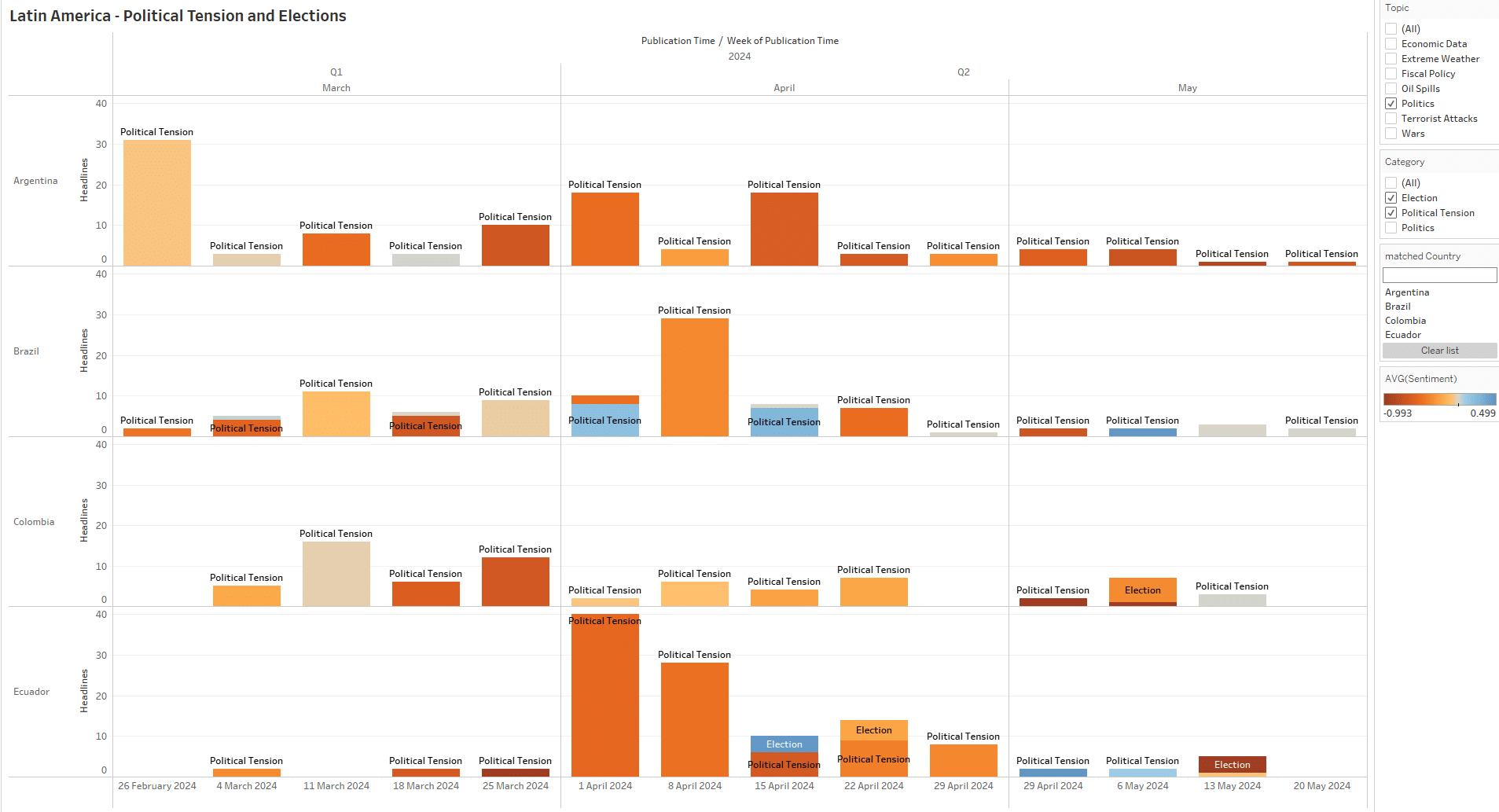In today’s rapidly changing political landscape, understanding the undercurrents of public sentiment and media portrayal is crucial for grasping the full scope of political dynamics in any region. At Permutable AI’s, our innovative analysis of news headlines provides an in-depth look into the political trends in Latin America, offering valuable insights that are particularly relevant given the region’s complex socio-political environment.
Harnessing the power of AI in political analysis
At Permutable AI, we leverage advanced algorithms to analyze thousands of news articles, extracting sentiment and frequency data that reflect broader public mood and media narratives. This approach allows for a nuanced understanding of political events, highlighting how certain issues are perceived across different nations within Latin America. Our recent study focused on countries such as Argentina, Brazil, Colombia, and Ecuador, covering a critical period from February to May 2024, providing a snapshot of the political trends in Latin America.
Findings from our sentiment analysis
The data revealed significant variations in the number of headlines related to political tensions and elections, providing insights into the political volatility and engagement within each country, crucial for understanding the political trends in Latin America:
- Argentina showed a sharp peak in political tension-related headlines in early March, reflective of a period of intense political activity and the country’s struggle for political stability, which gradually declined yet remained significant through May.
- Brazil exhibited a consistent stream of political tension headlines, indicating ongoing issues experienced by a country riddled with political problems that kept the political atmosphere active and possibly turbulent.
- Colombia and Ecuador displayed sporadic spikes in political headlines, corresponding with key political events and developments, particularly around election times.
These findings are particularly telling of the political pulse in each country, with media coverage serving as a barometer for national stability and public interest, crucial elements for understanding the political trends in Latin America.
Electoral insights
Election-related headlines provide additional layers of understanding. Notably, Ecuador experienced a surge in election-related coverage in late April, coinciding with its electoral cycle. This was closely mirrored by Colombia in early May. These spikes are critical for analysts and policymakers as they highlight moments of heightened public and media focus, potentially impacting national and international perceptions of political trends in Latin America.
Media sentiment and public opinion
One of the most striking aspects of our analysis is the sentiment score associated with the headlines. With scores ranging from -0.993 to 0.499, the data predominantly showed a blanket negative sentiment. This suggests that the media coverage was largely critical of the political situations, reflecting public discontent or skepticism towards political developments and leaders, an important indicator of the political trends in Latin America.
Implications and applications of AI-driven insights
AI-driven tools like those developed by our team at Permutable AI are reshaping political analysis by providing sophisticated real-time monitoring and predictive analytics. These tools enable organizations, governments, and analysts to detect underlying patterns and sentiments in political data, enhancing predictive accuracy for election outcomes and potential political unrest. With real-time data processing, stakeholders can proactively address emerging public opinions, tailor communication strategies to diverse demographic groups, and effectively manage crises through timely interventions.
Additionally, AI insights can be a powerful way of supporting strategic policymaking and international diplomacy by analyzing political stability and sentiments across regions, aiding in risk management and foreign policy decisions. These technologies also foster the development of customized policy initiatives likely to receive public support and provide simulation environments for training political strategists. As AI in political analysis advances, it promises not only more precise and efficient operations but also deeper insights into global political dynamics, revolutionizing how strategic decisions are made in complex political landscapes.
Political trends in Latin America: Final thoughts
Our detailed sentiment analysis of news headlines concerning political tension and elections in Latin America not only sheds light on the region’s ever-volatile political climate but also demonstrates the power of AI in enhancing our understanding of global events. As political landscapes continue to evolve, the ability to quickly and accurately analyze vast amounts of data will be indispensable in crafting informed, strategic responses that anticipate shifts in public opinion and media narratives concerning political trends in Latin America.
This comprehensive analysis not only aids in immediate strategic adjustments but also helps in long-term planning and policy-making, ensuring that responses are not merely reactive but are also proactive and well-informed. At Permutable AI, we are continuing to refine our analytical tools to provide potential for deeper insights into global political trends promises to reshape how we view and interact with the world of politics.
Get more insights and analysis
Take your strategic insight to the next level. Join us as an early user of Permutable AI’s cutting-edge geopolitical intelligence tools. Harness the power of advanced data analytics and real-time political analysis to navigate complex international landscapes more effectively. Sign up today to gain access to exclusive tools that transform vast data into actionable intelligence, empowering your decisions with precision. Sign up now and start shaping the future with informed, data-driven strategies.
